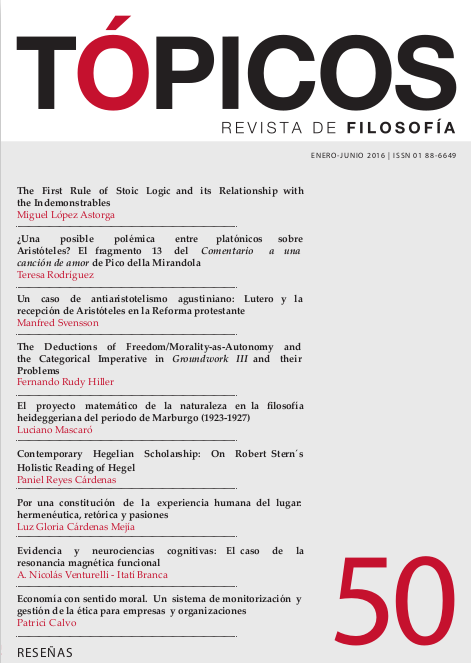Artículos
The First Rule of Stoic Logic and its Relationship with the Indemonstrables
Publicado 2015-12-20
Palabras clave
- indemostrables,
- deducción formal,
- reglas lógicas,
- razonamiento,
- lógica estoica
Cómo citar
Astorga, M. L. (2015). The First Rule of Stoic Logic and its Relationship with the Indemonstrables. Tópicos, Revista De Filosofía, 50, 9-23. https://doi.org/10.21555/top.v0i50.724
Resumen
Además de los indemostrables, la lógica estoica incluye varias reglas de reducción. En este trabajo, analizo la primera de ellas con el fin de comprobar si fue derivada formalmente a partir de los indemostrables o los estoicos pudieron plantearla a partir del uso de sus capacidades naturales de razonamiento. De esta manera, trato de mostrar que tenemos razones para apoyar ambas posibilidades y, basándome en un enfoque semántico como el de la teoría de los modelos mentales, de ofrecer argumentos al respecto.
Referencias
- Barnes, J., Bobzien, S., & Mignucci, M. (1999). Logic. The Cambridge History of Hellenistic Philosophy. K. Agra, J. Barnes, J. Mansfeld, & M. Schofield (Eds.) (77-176) Cambridge: Cambridge University Press.
- Bobzien, S. (1996). Stoic syllogistic. Oxford Studies in Ancient Philosophy. C. C. W. Taylor (Ed.) (133-192). Oxford: Clarendon.
- Bocheński, I. M. (1951). Ancient Formal Logic. Amsterdam: North-Holland.
- Boeri, M. D., & Salles, R. (2014). Los Filósofos Estoicos. Ontología, Lógica, Física y Ética. Santiago de Chile: Ediciones Universidad Alberto Hurtado.
- Gentzen, G. (1935). Untersuchungen über das logische Schließen I. Mathematische Zeitschrift, 39, 176-210.
- Gould, J. B. (1970). The Philosophy of Chrysippus. Albany: State University of New York Press.
- Johnson-Laird, P. N. (2006) How We Reason. Oxford: Oxford University Press.
- ____ (2010). Against logical form. Psychologica Belgica, 5(3/4), 193-221.
- ____ (2012). Inference with mental models. The Oxford Handbook of Thinking and Reasoning. K. J. Holyoak & R. G. Morrison (Eds.) (134-145). New York: Oxford University Press.
- Khemlani, S., Orenes, I., & Johnson-Laird, P. N. (2012). Negation: A theory of its meaning, representation, and use. Journal of Cognitive Psychology, 24(5), 541-559.
- ____ (2014). The negation of conjunctions, conditionals, and disjunctions. Acta Psychologica, 151, 1-7.
- Kneale, W., & Kneale, M. (2008). The Development of Logic. Oxford: Clarendon.
- Lukasiewicz, J. (1967). On the history of the logic of propositions. Polish Logic: 1920-1939. S. McCall (Ed.) (67-68). New York: Oxford University Press.
- Mates, B. (1953). Stoic Logic. Berkeley and Los Angeles: University of California Press.
- Mueller, I. (1978). An introduction to Stoic Logic. The Stoics. J. M. Rist (Ed.) (1-26). Berkeley: University of California Press.
- Oakhill, J. & Garnham, A. (Eds.) (1996). Mental Models in Cognitive Science. Essays in Honour of Phil Johnson-Laird. Hove: Psychology Press.
- Orenes, I. & Johnson-Laird, P. N. (2012). Logic, models, and paradoxical inferences. Mind & Language, 27(4), 357-377.
- O’Toole, R. R. & Jennings, R. E. (2004). The Megarian and the Stoics. Handbook of the History of Logic, Volume I. Greek, Indian and Arabic Logic. M. D. Gabbay and J. Woods (Eds.) (397-522). Amsterdam: Elsevier.






